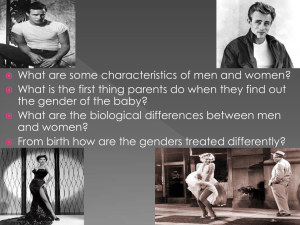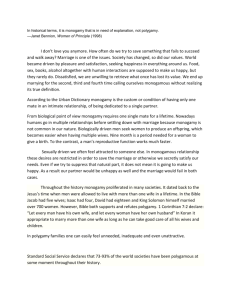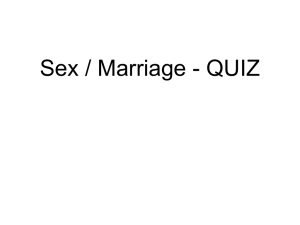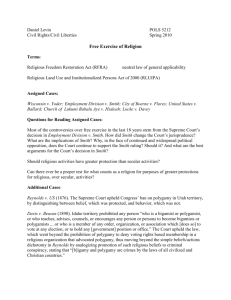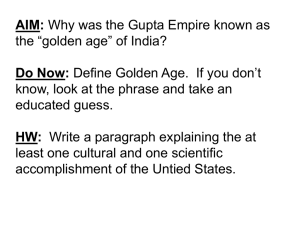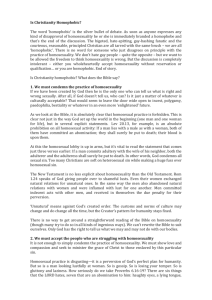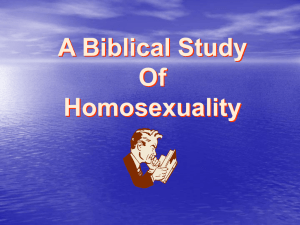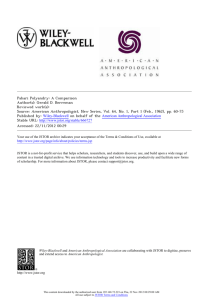summary of discussions on polygamy and polyandry edited
advertisement
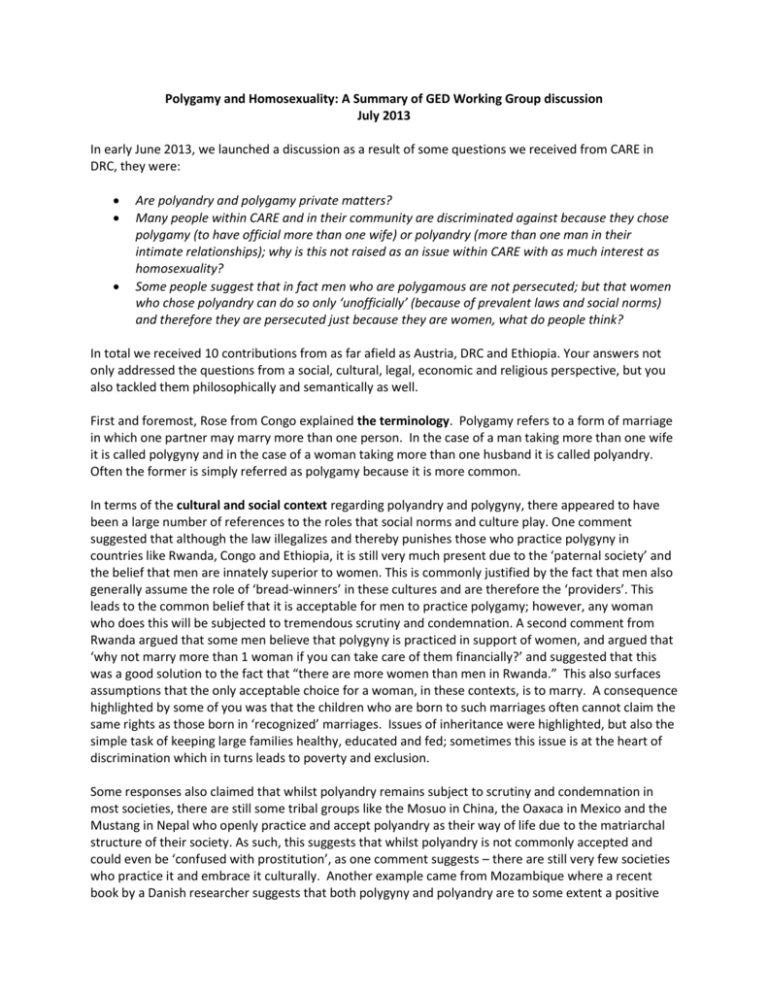
Polygamy and Homosexuality: A Summary of GED Working Group discussion July 2013 In early June 2013, we launched a discussion as a result of some questions we received from CARE in DRC, they were: Are polyandry and polygamy private matters? Many people within CARE and in their community are discriminated against because they chose polygamy (to have official more than one wife) or polyandry (more than one man in their intimate relationships); why is this not raised as an issue within CARE with as much interest as homosexuality? Some people suggest that in fact men who are polygamous are not persecuted; but that women who chose polyandry can do so only ‘unofficially’ (because of prevalent laws and social norms) and therefore they are persecuted just because they are women, what do people think? In total we received 10 contributions from as far afield as Austria, DRC and Ethiopia. Your answers not only addressed the questions from a social, cultural, legal, economic and religious perspective, but you also tackled them philosophically and semantically as well. First and foremost, Rose from Congo explained the terminology. Polygamy refers to a form of marriage in which one partner may marry more than one person. In the case of a man taking more than one wife it is called polygyny and in the case of a woman taking more than one husband it is called polyandry. Often the former is simply referred as polygamy because it is more common. In terms of the cultural and social context regarding polyandry and polygyny, there appeared to have been a large number of references to the roles that social norms and culture play. One comment suggested that although the law illegalizes and thereby punishes those who practice polygyny in countries like Rwanda, Congo and Ethiopia, it is still very much present due to the ‘paternal society’ and the belief that men are innately superior to women. This is commonly justified by the fact that men also generally assume the role of ‘bread-winners’ in these cultures and are therefore the ‘providers’. This leads to the common belief that it is acceptable for men to practice polygamy; however, any woman who does this will be subjected to tremendous scrutiny and condemnation. A second comment from Rwanda argued that some men believe that polygyny is practiced in support of women, and argued that ‘why not marry more than 1 woman if you can take care of them financially?’ and suggested that this was a good solution to the fact that “there are more women than men in Rwanda.” This also surfaces assumptions that the only acceptable choice for a woman, in these contexts, is to marry. A consequence highlighted by some of you was that the children who are born to such marriages often cannot claim the same rights as those born in ‘recognized’ marriages. Issues of inheritance were highlighted, but also the simple task of keeping large families healthy, educated and fed; sometimes this issue is at the heart of discrimination which in turns leads to poverty and exclusion. Some responses also claimed that whilst polyandry remains subject to scrutiny and condemnation in most societies, there are still some tribal groups like the Mosuo in China, the Oaxaca in Mexico and the Mustang in Nepal who openly practice and accept polyandry as their way of life due to the matriarchal structure of their society. As such, this suggests that whilst polyandry is not commonly accepted and could even be ‘confused with prostitution’, as one comment suggests – there are still very few societies who practice it and embrace it culturally. Another example came from Mozambique where a recent book by a Danish researcher suggests that both polygyny and polyandry are to some extent a positive system for women in the context a matrilineal society. The contributor spoke of the book being heavily criticized in Mozambique suggest that this ‘demonstrates how our judgment is heavily influenced by the … partriarchal systems in which we grew up.’ She further suggests that ‘It is difficult to envisage a different societal model where men and women can have multiple partners.’ This contributor further reflected on what it means for CARE. She concludes: “If such societal models are designed on consensus and men and women are benefitting equally from polygamy, why should we try to influence it? If it is not based on consensus and results in a form of abuse, then influencing it would make sense.” In terms of homosexuality, one contributor suggested that there is often more condemnation of men who are homosexual than women, often because lesbianism is seen as more of an extension of friendship. She further suggested that women are not defined by their sexuality, but that the very notion of a man who would voluntarily give up his power over a woman and agree to be in a relationship where he is ‘subject’ to another man’s power is quite threatening. Finally she stated that “I believe it is the threat to the very notion that a man is to ‘control’ that makes some people, particularly men, say that they are ‘disgusted’ by homosexuality’. This contributor then reflected on the existence of polygamous relationships, this does not usually challenge male dominance. The man is still the center of the family and polygamy by men reinforces the ‘man box’ idea that men must have unlimited and a nearly uncontrollable desire for sex. Finance and economics have also contributed to the question of why polygamy is more accepted than polyandry, due to the fact that men tend to be wealthier and thus have the power and influence to define norms in their favor. As one contributor put it, “polygamy does not challenge economic power relations between men and women of different economic classes – the more wealthy the man, the more women he should be allowed to have”. In regards to the role that power plays in the issue of polyandry and polygyny, a comment from Congo stated that women are subjected to more condemnation for polyandry than men are due to the fact that men are the ones who have established ‘laws’ and rights in their society. Your comments suggested that in most African societies, it is the men who define the enjoyment of rights and determine what is ‘acceptable’ and what should be condemned, and this allows them to render the laws in such a way that they can gain and profit from it. This point has also been made by another respondent from Ethiopia who said that those who possess power naturally exploit it to benefit themselves. This comment also goes on to suggest that polygyny and polyandry can easily be practiced by anyone who is in power, as their power and influence will enable them to do it and yet emerge unscathed from society’s scrutiny. Nevertheless, this does not mean that it is accepted and condoned simply because polygyny is accepted and commonly practiced by powerful men. Many of you mentioned that the issue is still very contentious in some societies. Religion also plays a part in our understanding and beliefs on these issues. In terms of why homosexuality is subjected to a larger amount of attention than polygamy, a number of comments from countries within the African continent suggested that religion plays a large role in homophobia. Whilst it appears that polygamy is somewhat ‘natural’ as it relates to the marriage between men and women, homosexuality is commonly described as ‘unnatural’ and even outlawed and condemned in Islamic and Christian cultures. Interestingly, there were a limited number of responses to the question about homosexuality, and one comment even cited that this is because homosexuality is still being branded as ‘taboo’ and ‘evil’. As one contributor pointed out, the adulterer who was threatened with stoning in the New Testament was a woman (not a man); another contributor pointed out that marriage is between one man and one woman. She reflected that in some contexts the practice of polygyny is supported because there are more women than men – but she questioned then whether the practice of polyandry should be supported when there are more men than women. A further comment reflected on why we are quick to highlight homosexuality in Biblical terms as an abomination punishable by death, whereas in the same scripture, other sins (such as adultery) are similarly termed, but we tend to accept them. As one person put it, ‘even discussions around homosexuality in Rwanda are almost intolerable’. This respondent went onto say that the lack of discussion on the theme of homosexuality may be due to the fact that ‘civil society and humanitarian organizations have not carried out studies which show us the prevalence of this behavior in our communities’. As far as the legal systems are concerned, one contributor pointed out that polygamy is ‘clashing with national legislation which mostly foresees marriage with only one person’. She surfaced the polarity that often exists between ‘traditions’ and national legislation or ‘modern’ and traditional forms of relationships. She noted that while the laws exist in many contexts, it does not stop people from having affairs when they are married; it is however outlawed in her country (Austria) to have more than one legal marriage at one time. Other contributions were emphatic that homosexuality is simply outlawed and not tolerated in many contexts. While, although the justice system in Rwanda penalizes the practice of polygamy, it is still culturally acceptable and some women even resign themselves to it by saying that they are ‘ok with it’ “so long as the husband can still provide”. There appears to be a huge variety in the nature of views regarding the issues of polygamy, polyandry, polygyny and homosexuality and thus this could even be perceived as a strength, as it allows us to embrace and understand one another’s perspectives. As one contributor put it ‘human beings are full of double standards and contradictions’. She also put out a warning, ‘I know that power holders in whatever shape or form will have their opinions enforced’ and so we need to be careful about power, because often the discussion about these issues are held at ‘urban level’ thus excluding the women and men in such marriages and this can put them in a vulnerable position. This discussion really highlighted how awareness and dialogue in our gender equity and diversity work is a core approach. The challenge might be for all of us, to understand each other and suspend judgment as we seek to truly learn about one another as human beings. As one contributor asked, “How do we work with others who have a different orientation than our own?” Another one asked, “How can the issue of homosexuality be discussed and even be easily featured in the work that we do if personal views are most probably very divergent.” A further point raised was, “how do we engage with communities in this topic in a way that promotes human dignity while also promoting human rights, which include women’s rights to equality?’ As another one put it, “It is a very emotional topic and is at the heart of the stereotype of how a man or a woman can/should/must perform in a given society.” As one person suggested, ‘we also must be sure that as CARE staff, we continue to reflect on our own practices. We cannot engage communities in topics about gender equality if we are not comfortable talking about homosexuality, polygamy and sexuality in general.” “We must also be able to engage in conversations about power and privilege.” I encourage you to continue to seek to understand one another – even (and perhaps especially) where you disagree! Let us reflect on “to what extent we create an environment where those who do not practice the norm in terms of sexuality and marriage feel valued and that in fact their diversity brings value to the organization.”
